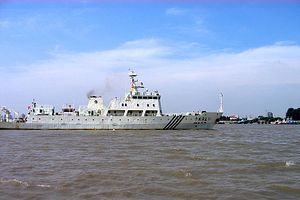China’s assertiveness in Asia could worsen in the future as Beijing seeks to expand its regional reach, Japan’s top military commander Admiral Katsutoshi Kawano said Thursday.
“My sense is that this trend will continue into the future where China will go beyond the island chain in the Pacific. So if anything, I believe the situation would worsen,” Kawano said in translated remarks at the Center for Strategic and International Studies, a Washington, D.C.-based think tank.
In the South China Sea specifically, Kawano noted that at the annual Shangri-La Dialogue this year, which he attended, the Chinese representative did not deny that China would consider more provocative actions in the future, like using the artificial islands it has built for military purposes or establishing an Air Defense Identification Zone (ADIZ) just like it did over the East China Sea in 2013 (See: “Confronting China’s ‘New’ Military Challenge in the South China Sea”).
“The representative from China did not deny the possibility of declaring an ADIZ in the South China Sea. The representative also did not deny the possibility [that] the man-made islands… could be used for military purposes as well,” he said.
These signals, Kawano said, were worrying for Japan, considering the importance of these sea lanes to its economy and security.
In response, Richard Armitage, a pivotal figure in U.S.-Japan relations who last served deputy secretary of state under George W. Bush, said that if China does declare an ADIZ in the South China Sea, the United States should respond the way it did following Beijing’s declaration of an East China Sea ADIZ. In that case, Washington flew two warplanes over the East China Sea without informing Beijing in advance, effectively defying its zone just days after China had declared it. Pentagon officials said that the flights were meant to send a clear message to China that the United States would not permit China to restrict freedom of overflight or navigation.
“China has no ability to do much more than to declare a zone. We should make sure it does not stand,” Armitage said as he engaged in a conversation with Kawano.
Kawano is on a visit to Washington, D.C. from July 15 to 18 based on an invitation by General Martin Dempsey, the chairman of the Joint Chiefs of Staff.

































